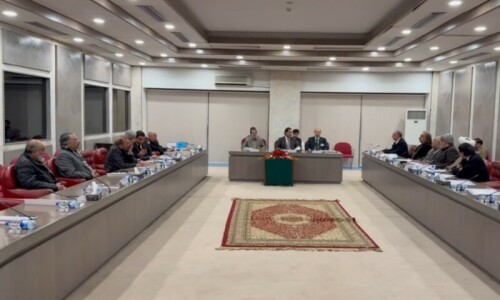ISLAMABAD: The government has asked the National Electric Power Regulatory Authority (Nepra) to allow increasing electricity rates by up to Rs11 per unit for high-end residential consumers across the country to bear the additional burden of consumers with lower consumption.
The rate approved by the federal government under the “tariff rebasing 2022-23” for consumers with a monthly consumption slab of 101-200 units and above is significantly higher than the Rs7.91 per unit increase in the uniform national average determined by the regulator a few weeks ago.
Besides the massive cross-subsidisation among various consumer slabs, the government would still be providing Rs234 billion in subsidies — Rs220bn for distribution companies of ex-Wapda and Rs14bn for K-Electric (KE) — to finance the tariff rebasing cost of poor consumers, according to the Power Division’s request to the regulator.
It said the request was based on government approval “in anticipation of approval of the cabinet” to modify the Economic Coordination Committee (ECC) decision to the extent that “consumers consuming less than 100 units and falling in the non-protected category shall be charged Rs13.48/unit instead of Rs19.56/unit and that the consequential revenue differential shall be adjusted in various categories”. The ECC approved a Rs3.50 per unit increase in base tariff in July, followed by Rs3.50 in August-September and the remaining Rs1 per unit in October billing.
Higher consumption categories to take bulk of the burden
The government has told the regulator that it wanted to increase power rates for consumers of the “unprotected category” using up to 100 units per month by about Rs4.06 per unit instead of Rs7.91 worked out by Nepra, and hence this burden has to be passed on to the higher consumption categories.
This has been done to address a tariff anomaly. Under the existing tariff scheme, consumers using less than 200 units for a continuous six preceding months are categorised as “protected” and their tariff will remain unchanged. On the other hand, those with the first 100 units slip into the ‘unprotected’ category if their consumption exceeds the benchmark even for a month. Their rates will now be raised in stages by Rs4.06 per unit to Rs13.48 per unit for the current fiscal year.
Under the government directive, the base tariff for those consuming 101-200 would be increased by Rs7.21 per unit in phases to Rs18.95, while the rate for 201-300 per month would go up by Rs8.31 to Rs22.14 per unit. The rate for 301-400 units would increase by Rs4.30 per unit to Rs25.53, while the rate for 401-500 units would increase by Rs6.51 per unit to Rs27.74.
Likewise, the base rate for 501-600 units will increase to Rs29.16 per unit, up by Rs7.93, and that of 601-700 units will go up to Rs30.30 per unit, showing an increase of Rs8.97 per unit.
The base tariff for consumption above 700 units per month would go up to Rs35.22 per unit, with an increase of Rs11 per unit. The base rate for time of use (TOU) meters would go up by Rs10.06 to Rs34.39 for peak consumption hours and to Rs28.07 per unit for off-peak hours.
The Nepra will complete the formality of a public hearing on Wednesday as required under a court order to adjust tariff subsidies allocated by the federal government for immediate implementation as required under the IMF conditionality.
Published in Dawn, July 20th, 2022













































